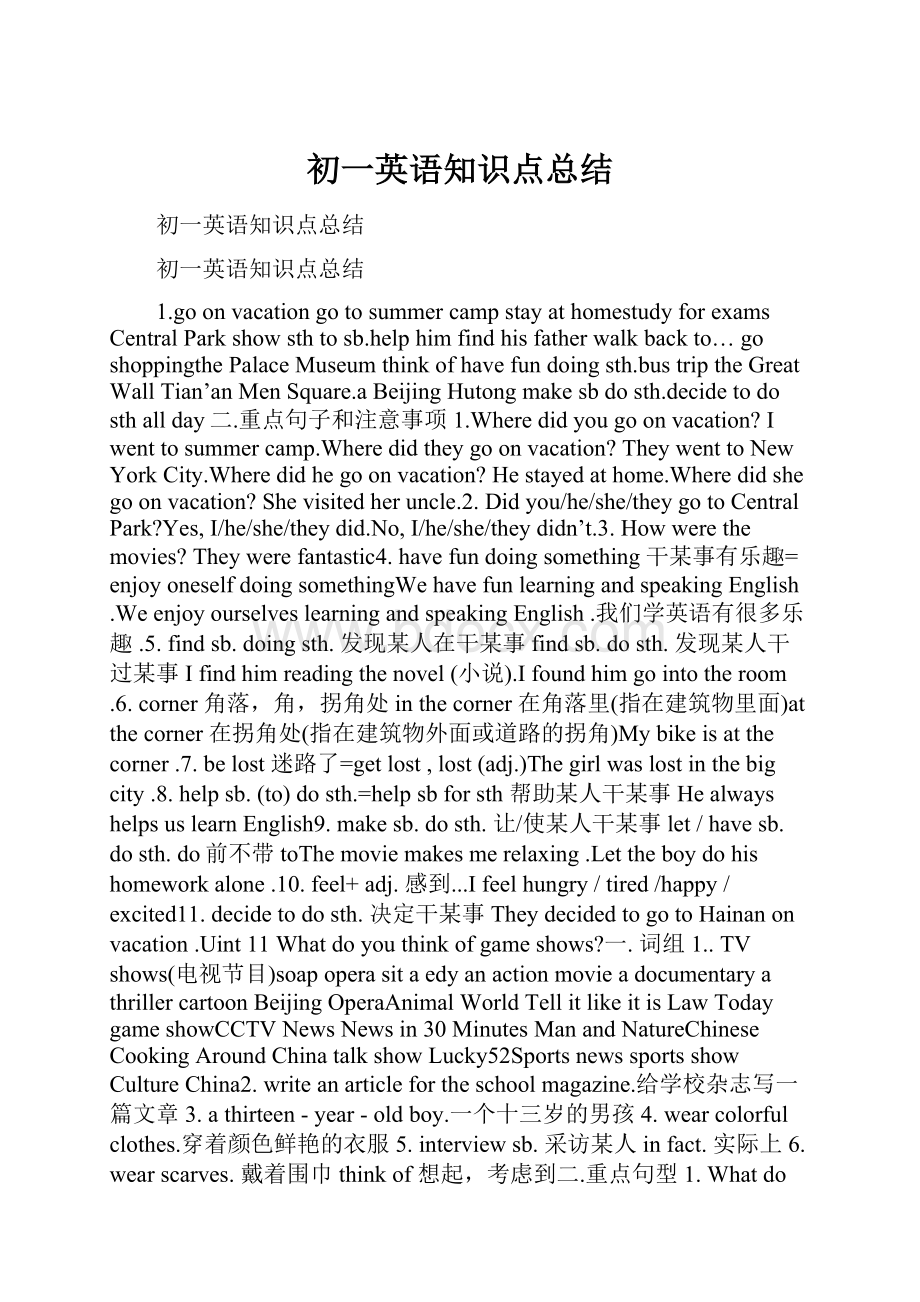初一英语知识点总结.docx
《初一英语知识点总结.docx》由会员分享,可在线阅读,更多相关《初一英语知识点总结.docx(9页珍藏版)》请在冰豆网上搜索。

初一英语知识点总结
初一英语知识点总结
初一英语知识点总结
1.goonvacationgotosummercampstayathomestudyforexamsCentralParkshowsthtosb.helphimfindhisfatherwalkbackto…goshoppingthePalaceMuseumthinkofhavefundoingsth.bustriptheGreatWallTian’anMenSquare.aBeijingHutongmakesbdosth.decidetodosthallday二.重点句子和注意事项1.Wheredidyougoonvacation?
Iwenttosummercamp.Wheredidtheygoonvacation?
TheywenttoNewYorkCity.Wheredidhegoonvacation?
Hestayedathome.Wheredidshegoonvacation?
Shevisitedheruncle.2.Didyou/he/she/theygotoCentralPark?
Yes,I/he/she/theydid.No,I/he/she/theydidn’t.3.Howwerethemovies?
Theywerefantastic4.havefundoingsomething干某事有乐趣=enjoyoneselfdoingsomethingWehavefunlearningandspeakingEnglish.WeenjoyourselveslearningandspeakingEnglish.我们学英语有很多乐趣.5.findsb.doingsth.发现某人在干某事findsb.dosth.发现某人干过某事Ifindhimreadingthenovel(小说).Ifoundhimgointotheroom.6.corner角落,角,拐角处inthecorner在角落里(指在建筑物里面)atthecorner在拐角处(指在建筑物外面或道路的拐角)Mybikeisatthecorner.7.belost迷路了=getlost,lost(adj.)Thegirlwaslostinthebigcity.8.helpsb.(to)dosth.=helpsbforsth帮助某人干某事HealwayshelpsuslearnEnglish9.makesb.dosth.让/使某人干某事let/havesb.dosth.do前不带toThemoviemakesmerelaxing.Lettheboydohishomeworkalone.10.feel+adj.感到...Ifeelhungry/tired/happy/excited11.decidetodosth.决定干某事TheydecidedtogotoHainanonvacation.Uint11Whatdoyouthinkofgameshows?
一.词组1..TVshows(电视节目)soapoperasitaedyanactionmovieadocumentaryathrillercartoonBeijingOperaAnimalWorldTellitlikeitisLawTodaygameshowCCTVNewsNewsin30MinutesManandNatureChineseCookingAroundChinatalkshowLucky52SportsnewssportsshowCultureChina2.writeanarticlefortheschoolmagazine.给学校杂志写一篇文章3.athirteen-year-oldboy.一个十三岁的男孩4.wearcolorfulclothes.穿着颜色鲜艳的衣服5.interviewsb.采访某人infact.实际上6.wearscarves.戴着围巾thinkof想起,考虑到二.重点句型1.Whatdoyouthinkofsoapoperas?
Ican'tstandthem.2.Whatdoyouthinkofsportsshows?
Idon'tmindthem.3.Whatdoesshethinkof"HilltopHigh"?
Shedoesn'tlikeit.4.WhatdoesTonythinkofTommy?
Helikeshim.5.WhatdotheythinkofAmanda?
Theyloveher.三.重难点解析1.wear(v.动词)"穿,戴,佩"。
根据不同宾语,翻译不同的汉语意思。
wearearrings戴耳环wearadre穿连衣裙wearawatch戴手表wearabeard蓄胡子wearlonghair留长发2.think"想,考虑,思索"(v.动词)可以和许多介词搭配,组成新的意思。
A:
thinkof"考虑";"有...的看法",有时等于thinkabout.WhatdoeshethinkofBeijingOpera?
他对京剧有什么看法?
Mymotheralwaysthinksofeverything!
我妈妈总是想到所有的东西。
thinkhighlyofsb./sth.对某人或某物评价甚高MrBlackthinkshighlyofhisson.布莱克先生对他儿子评价甚高。
B:
thinkabout"考虑"(指计划,观念,看它是否相宜、可行)HeisthinkingaboutgoingtoChina.他正在考虑去中国。
3.too与either的区别too"也",表示肯定意义,与肯定的表达方法连用;而either"也不",表示否定意义,与否定的表达方法连用。
(1)—Mybrotherlikestoplaysoccer.我哥哥喜欢踢足球。
—Ido,too.我也是(喜欢)。
(2)—Mybrotherdoesn'tliketoplaysoccer.我哥哥不喜欢踢足球。
—Idon't,either.我也不喜欢。
also也可以表示"也",但一般情况下,too和either放在句子之后,also放在动词之前。
Wealsolovetalkshows.我们也喜欢访谈节目。
4.athirteen-year-oldboy一个十三岁的男孩此结构中,year用单数形式,且用连字符,这种结构用作定语。
afive-month-oldbaby一个五个月大的婴儿5.enjoy(v.喜爱,享受)enjoy后面接名词、代词或动名词,注意与like/love用法的区别。
like/love还可以接动词不定式(todo)。
Ienjoythesoapoperas.我喜爱肥皂剧。
Ienjoywatchingthesoapoperas.我喜爱看肥皂剧。
但我们不能说:
Ienjoytowatchthesoapoperas.只能说:
Ilike/lovetowatchthesoapoperas.6.mind表示"介意,反对"的意思时,通常用在疑问句、否定句中。
Wouldyoumindopeningthewindow?
请你打开窗子好不好?
Hedoesn'tmindthecoldweatheratall.他一点都不在乎寒冷的天气。
多用于以下句型:
(表示请求或征求意见)后接动名词/名词/代词。
Wouldyoumind(doing)...?
Doyoumind(doing)...?
7.stand表示忍受(多用于否定句、疑问句)Hecan'tstandthehotweather.他忍受不了炎热的天气。
Canyoustandthepain?
你忍受得了疼吗?
9.Whatdoyouthinkof...?
你认为...怎么样?
(谈论对某事物的喜好程度)可选择的回答有:
(1)Ilikeit.
(2)Idon'tmindit.
(3)Idon'tlikeit.
(4)Ican'tstandit.
(5)Ilikeitverymuch.(6)Iloveit.(7)It'sbeautiful.(8)They'refantasticUnit12Don'teatinclass.一.短语.1.incla在课上2.onschoolnights在上学的晚上3.schoolrules校规4.notalking禁止交谈5.listentomusic听音乐6.haveto不得不7.takemydogforawalk带狗去散步8.eatoutside在外面吃饭9.inthehallway在走廊上10.wearauniform穿制服11.arrivelateforcla上学迟到12.afterschool放学后17.beinbed在床上13.practicetheguitar练习弹吉它14.inthecafeteria在自助食堂里15.meetmyfriends和我朋友见面16.byteno'clock.十点之前18.theChildren'sPalace少年宫19.helpmymommakedinner帮助我妈做饭二.重点句型1.Don’tarrivelateforschool=Don’tbelateforschool2.Don’tfight=3.Don’tlistentomusicintheclassroom.4.Don’truninthehallways5.Don’tsmoke.It’sbadforyourhealth.6.Don’tplaycardsinschool7.Don’ttalkinclass8.Don’twatchTVonschoolnights.9.Don’tsleepinclass.10.Don’tplaysportsintheclassrooms.11.Don’tsingsongsatnight.12.Don’ttalkwhenyoueat.13.Don’twearhatsinclass.14.Dohomeworkby10:
00.15.Cleanyourhouse!
16.Makethebed.17.Canwe……?
Yes,wecan.No,wecan’t.Eg:
Canwearrivelateforcla?
No,wecan’t.Wecan’tarrivelateforclass.18.Doyouhavetowashyourclothes?
Yes,Ido./No,Idon’t.三.重难点解析:
1.情态动词haveto的用法,意思是"必须、不得不",它侧重于客观上的必要和外界的权威。
(1)结构:
主语+haveto+动词原形+其他(一般现在时,主语是第三人称单数时,用hasto;句子是过去时,用hadto.)如:
Wehavetowearsneakersforgymclass.在体育课上,我们必须穿运动鞋。
Tomhastopracticetheguitareveryday.汤姆每天必须练习弹吉它。
Ihadtogetupat5:
00amlastMonday.上周一,我不得不早上5点起床。
(2)否定形式:
主语+don'thaveto+动词原形+其他(一般现在时,主语是第三人称单数时,用doesn'thaveto.句子是过去时,用didn'thaveto)如:
Nickdoesn'thavetowearauniform.尼克不必穿制服。
Wedidn'thavetodoourhomeworkatonce.我们不必马上完成作业。
(3)疑问句:
Do(Does或Did)+主语+haveto+动词原形+其他如:
Doyouhavetostayathomeonweekends?
周末你必须呆在家里吗?
Yes,Ido./No,Idon't.是的,我必须。
不,我不必。
Didhehavetogotobedby11:
00lastnight?
昨晚,他不得不11点前上床睡觉吗?
附送:
初一英语语法总结
初一英语语法总结
一、词法
1、名词A)、名词的数我们知道名词可以分为可数名词和不可数名词,而不可数名词它没有复数形式,但可数名词却有单数和复数之分,复数的构成如下:
一)在后面加s。
如:
fathers,books,Americans,Germans,apples,bananas二)x,sh,ch,s,tch后加es。
如:
boxes,glasses,dresses,watches,wishes,faxes三)1)以辅音字母加y结尾的变y为i再加es如:
baby-babies,family-families,duty-duties,edy-edies,documentary-documentaries,story-stories2)以元音字母加y结尾的直接加s。
如:
day-days,boy-boys,toy-toys,key-keys,ways四)以o结尾加s(外来词)。
如:
radios,photos,但如是辅音加o的加es:
如:
tomatoes西红柿,potatoes马铃薯五)以f或fe结尾的变f为v再加es(s)。
如:
knife-knives,wife-wives,half-halves,shelf-shelves,leaf-leaves,yourself-yourselves六)单复数相同(不变的)有:
fish,sheep,deer鹿子,Chinese,Japanese七)一般只有复数,没有单数的有:
people,pants,shorts,shoes,glasses,gloves,clothes,socks八)单词形式不变,既可以是单数也可以是复数的有:
police警-察局,警-察,class班,同学,family家,家庭成员九)合成的复数一般只加主要名词,多数为后一个单词。
如:
actionmovie-actionmovies,penpal-penpals;但如果是由man或woman所组成的合成词的复数则同时为复数。
如:
mandoctor-mendoctors,womanteacher-womenteachers十)有的单复数意思不同。
如:
fish鱼fishes鱼的种类,pa-pe-r纸pa-pe-rs报纸,卷子,论文,work工作works作品,工厂,glass玻璃glasses玻璃杯,眼镜,orange桔子水oranges橙子,light光线lights灯,people人peoples民族,time时间times时代,次数,chicken鸡肉chickens小鸡十一)单个字母的复数可以有两种形式直接加s或’s。
如:
Is(I’s),Ks(K’s)。
但如是缩略词则只加s。
如:
IDs,VCDs,SARs十二)特殊形式的有:
child-children,man-men,woman-women,foot-feet,mouse-mice,policeman-policemen,Englishman-EnglishmenB)名词的格当我们要表示某人的什么东西或人时,我们就要使用所有格形式。
构成如下:
一)单数在后面加’s。
如:
brother’s,Mike’s,teacher’s二)复数以s结尾的直接在s后加’,如果不是以s结尾的与单数一样处理。
如:
Teachers’Day教师节,classmates’;Children’sDay六一节,Women’sDay三八节三)由and并列的名词所有时,如果是共同所有同一人或物时,只加最后一个’s,但分别拥有时却分别按单数形式处理。
如:
MikeandBen’sroom迈克和本的房间(共住一间),Mike’sandBen’srooms迈克和本的房间(各自的房间)
2、代词项目人称代词物主代词指示代词反身代词人称主格宾格形容词名词性第一人称单数Imemyminemyself复数weusouroursourselves第二人称单数youyouyouryoursyourself复数youyouyouryoursyourselves第三人称单数sheherherhersherselfhehimhishishimselfitititsitsthisthatitself复数theythemtheirtheirsthesethosethemselves
3、动词A)第三人称单数当动词是第三人称单数时,动词应该像名词的单数变动词那样加s,如下:
一)一般在词后加s。
如:
es,spells,waits,talks,sees,dances,trains二)在x,sh,ch,s,tch后加es。
如:
watches,washes,wishes,finishes三)1)以辅音字母加y结尾的变y为i再加es。
如:
study-studies,hurry-hurries,try-tries2)以元音字母加y结尾的直接加s。
如:
plays,says,stays,enjoys,buys四)以o结尾加es。
如:
does,goes五)特殊的有:
are-is,have-hasB)现在分词当我们说某人正在做什么事时,动词要使用分词形式,不能用原形,构成如下:
一)一般在后加ing。
如:
spell-spelling,sing-singing,see-seeing,train-training,play-playing,hurry-hurrying,watch-watching,go-going,do-doing二)以不发音e的结尾的去掉e再加ing。
如:
dance-dancing,wake-waking,take-taking,practice-practicing,write-writing,have-having三)以重读闭音节结尾且一个元音字母+一个辅音字母(注意除开字母组合如show–showing,draw-drawing)要双写最后的辅音字母再加ing。
如:
put-putting,run-running,get-getting,let-letting,begin-beginning四)以ie结尾的变ie为y再加ing。
如:
tie-tying系die-dying死lie-lying位于
4、形容词的级我们在对两个或以上的人或物进行对比时,则要使用比较或最高级形式。
构成如下:
一)一般在词后加er或est(如果是以e结尾则直接加r或st)。
如:
greater-greatest,shorter–shortest,taller–tallest,longer–longest,nicer-nicest,larger-largest二)以重读闭音节结尾且1个元音字母+1个辅音字母(字母组合除外,如few-fewerfewest)结尾的双写结尾的辅音再加er/est。
如:
big-biggerbiggest,red-redderreddest,hot-hotterhottest三)以辅音字母+y结尾的变y为i加er/est。
如:
happy-happierhappiest,sorry-sorriersorriest,friendly-friendlierfriendliest(morefriendlymostfriendly),busy-busierbusiest,easy-easiereasiest四)特殊情况:
(两好多坏,一少老远)good/well-betterbestmany/much-moremostbad/ill–worseworstlittle-leleastold-older/elderoldest/eldestfar-farther/furtherfarthest/furthest
5、数词(基变序,有规则;
一、
二、三,自己背;五、
八、九、十二;其它后接th;y结尾,变为i,eth跟上去。
)first,second,third;fifth,eighth,ninth,twelfth;seventh,tenth,thirteenth,hundredth;twenty-twentieth,forty-fortieth,ninety-ninetieth
二、句式1.陈述句肯定陈述句a)Thisisabook.(be动词)b)Helooksveryyoung.(连系动词)c)Iwantasweatlikethis.(实义动词)d)Icanbringsomethingstoschool.(情态动词)e)There’saputeronmydesk.(Therebe结构)否定陈述句a)Thesearen’ttheirbooks.b)Theydon’tlooknice.c)Katedoesn’tgotoNo.4MiddleSchool.d)Katecan’tfindherdoll.e)Thereisn’tacathere.(=There’snocathere.)2.祈使句肯定祈使句a)Pleasegoandasktheman.b)Let’slearnEnglish!
c)Comein,please.否定祈使句a)Don’tbelate.b)Don’thurry.3.疑问句1)一般疑问句a)IsJimastudent?
b)CanIhel